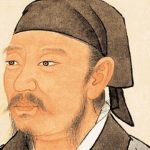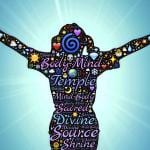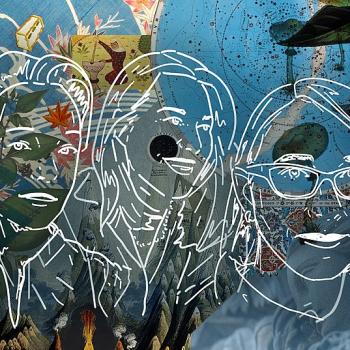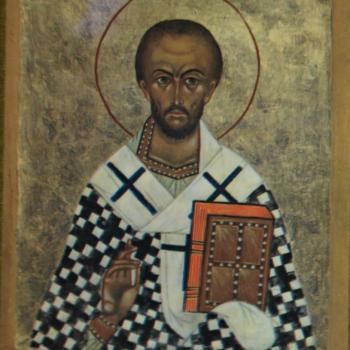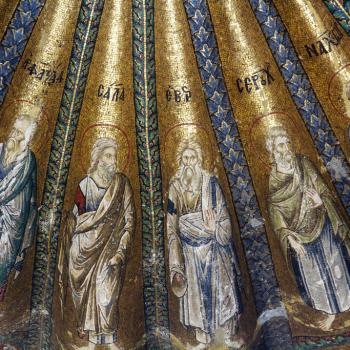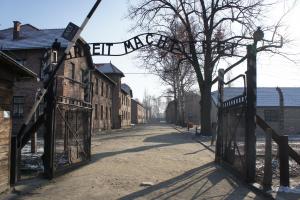
January 27, 1945. Soviet soldiers, without looking for it, without knowing what they would soon discover, arrived at Auschwitz. The Germans had already given up on the concentration camp. They left it, forcing many of its inmates to go with them on a death march. Those who were too infirm, the elderly and the extremely young, those who could not make such a march, were left behind, as were the bodies of several hundred of the Jews which had recently been executed. With around seven thousand Jews left behind, often in terrible health, the Soviet soldiers were to be among the first to learn of the great horrors which had happened at Auschwitz. There were also to be among the first to help the survivors, making sure that they not only would be nurtured back to health, but given their freedom.
Because the Liberation of Auschwitz officially took place on the 27th of January, the day itself has become a day in which the Shoah, the Holocaust, is remembered, hoping that we will never see such evil again. Pope Francis, understanding this, declared:
The Shoah must not be forgotten. It is “the enduring symbol of the depths to which human evil can sink when, spurred by false ideologies, it fails to recognize the fundamental dignity of each person, which merits unconditional respect regardless of ethnic origin or religious belief”. As I think of it, I cannot help but repeat this prayer: “Lord, remember us in your mercy. Grant us the grace to be ashamed of what we men have done, to be ashamed of this massive idolatry, of having despised and destroyed our own flesh which you formed from the earth, to which you gave life with your own breath of life. Never again, Lord, never again!”[1]
The Holocaust should haunt us. The Holocaust should shame us. The Holocaust should horrify us. It should do all these things because it shows us what we are capable of doing, and if we do not remember the Holocaust, if we do not remember how the Holocaust came about, then history can repeat itself.
It is good Auschwitz was liberated, but it would have been better if Auschwitz had never existed. We must remember the good, but we must keep in mind the evil. How did the Shoah come about? Christians, in power, Christians in control, embraced anti-Semitism, and used it as a tool to stay in power and control. Jews were treated as scapegoats for the world’s problems. This would not have worked except for the fact that they had first been demonized by Christians. While it is true, not every Christian accepted the demonization, not every Christian accepted such scapegoating, and some, indeed, fought hard to defend the Jews, the general populace accepted what they had been told and supported the ideologies which would be collected and modernized by the Nazis and used to lead to the mass destruction of the Jews.
Christians must acknowledge their role in the Holocaust: while not all of them created the concentration camps and executed them in mass, Christians established the propaganda which justified it (even as, of course, many promoted it without objection, at least, while the Holocaust was being engaged).
Jews were treated as if they were less than human. Christians, through the centuries, had given them less rights, and with less rights, it was easy to take the next step, ask why they had less rights, and see the answer had to be that they were less than human.
After the Shoah, Christian leaders recognized, with horror, what Christianity had become. They saw how they did not stop the horror of the Holocaust, but helped create it. They realized that they needed to speak out against anti-Semitism and the policies and practices which led to the Shoah. In Catholic circles, this was exemplified with Nostra Aetate, promulgated at Vatican Council II, wherein Christian anti-Semitism was denounced, even as it condemned similar prejudices against people of other faiths and backgrounds:
The Church reproves, as foreign to the mind of Christ, any discrimination against men or harassment of them because of their race, color, condition of life, or religion. On the contrary, following in the footsteps of the holy Apostles Peter and Paul, this sacred synod ardently implores the Christian faithful to “maintain good fellowship among the nations” (1 Peter 2:12), and, if possible, to live for their part in peace with all men, so that they may truly be sons of the Father who is in heaven.[2]
Nostra Aetate indicated what Christians should have known from the beginning: hate is not of God. But such condemnation is not enough; Christians, indeed, humanity, needs to do better than merely reject hate. It must be more than reactive, it must be proactive. We must embrace of the common good, looking to support and help each other, even in our differences. If we look to the other with love, instead of hate, if we desire to help the other, instead of only be concerned about ourselves, we will be able to build a better world and put a stop to those ideologies which would otherwise have us create a new Holocaust in the future. Thus, St. John Paul II, reflecting upon this, said:
During the Second Vatican Council, the Church clearly and definitively reaffirmed her rejection of all expressions of anti-Semitism. However, the sincere defloration and condemnation of those hostilities directed against the Jewish people that have often marked history do not suffice; we must also develop friendship, esteem and brotherly relations with them. These friendly relations, reinforced and nurtured after the session of the Council in the last century, saw us united in commemorating the victims of the Shoah, especially those who were wrenched from their families and from your beloved Jewish Community in Rome in October 1943 and interned in Auschwitz. May their memory be blessed and induce us to work as brothers and sisters.[3]
Sadly, as we reach the seventy-sixth anniversary of the Liberation of Auschwitz, it seems as we are already losing sight of the Shoah. We are ignoring the spiritual and humanistic legacies which were developing in its aftermath. We are losing sight of the common good. We are forgetting what had led up to it, and so, around us, we see many people repeating the errors of the past. Many now embrace the dark paranoia and hate which preceded the Shoah; it should not be surprising we see them pushing, once again, for dehumanizing the other and justifying the unjustifiable as a result. While it is not only Christians who are engaging such dark and deadly ideologies, they certainly continue to be a major player in their creation and promotion. Many Christians, ignoring the legacy of the Holocaust, look to the past, to what was said about the Jews, and regurgitate the evil which they read, using it to justify the creation of a new, modern anti-Semitism. It is a growing problem, but it is being made worse, as it is being joined to new ideologies, new attempts of authoritarian control over the world, with people using various grievances to justify their hate and abuse of others. There is a militancy connected with such groups, with a worship of strength and power, whereby any attempt to demonstrate compassion or support human dignity is frowned upon as weak and worthless. It is the kind of militancy which helped support Donald Trump’s rise in power, but also the kind which thought it could take control of the United States and force its vision upon the nation with a coup (centered upon Trump). The hatred which is promoted by these groups is often enforced by a selective reading of religious traditions, using elements of those traditions to suppress and ignore the rest (is that not what we see with so-called Christians having their focus placed on abortion, so that when other issues arise, they could be led to ignore those concerns? Who cares of the dictator is cruel, they tell us, if he cares about abortion?).
We must not allow another Auschwitz to happen. We must be proactive, rejecting the ideologies which led to Auschwitz. We must not allow Christianity to take on and promote the demons of its past. It is of course, not just a Christian problem, but the prominence of Christianity in the world, and the prominence of these ideologies coming from Christians in positions of power, means it is a special problem for Christians. We must recognize the problem. We must confess it to the world. We must put a stop to it. We must fix what has already been damaged by our negligence. And we must truly work to overcome such hatred and dehumanization of others, otherwise, it will only be a matter of time that such dehumanization will lead to new calls for a “final solution” for those who are deemed unworthy of being treated with dignity and respect. When we denigrate humanity, when we allow racism and sexism to continue, when we ignore the plight of the poor, when we embolden the rich and powerful, all of this will create the conditions necessary for a new Auschwitz if we are not careful.
We might say never again, but we must do more than say it, we must act, otherwise, all the evil will fester and create the conditions for a new tyrant, with a new kind of Auschwitz, one which, with modern technology and capability, could end up being much more horrifying than before. We must do more than say never again. We must truly mean it, and act now before it is too late.
[1] Pope Francis, Fratelli tutti. Vatican translation. ¶247.
[2] Nostra Aetate. Vatican translation. ¶5.
[3] St. John Paul II, “Message to the Chief Rabbit of Rome, Dr. Riccardo de Segni, For the Centenary of the Great Synagogue of Rome” (5-22-2004).¶3.
Stay in touch! Like A Little Bit of Nothing on Facebook.
If you liked what you read, please consider sharing it with your friends and family!


